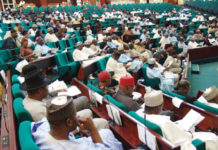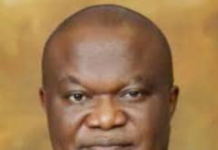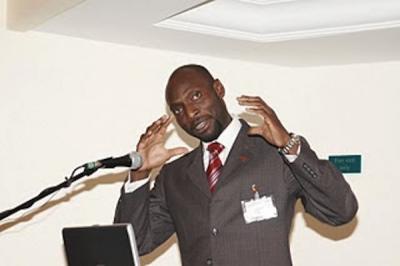Again, attempts by the Federation Accounts Allocation Committee (FAAC), the statutory body authorized to share revenues accruing into the federation account among beneficiaries (federal, states, FCT, local government and revenue generating agencies) failed to agree on what the office of Accountant General of the Federation Jonah Otunla proposed for distribution in the month of August 2013. This has been a recurring trend in the last many months as signs of serious distress in the economy refuse to clear. This is despite insistence by Coordinating Minister of the Economy and Minister of Finance, Ngozi Okonjo-Iweala that all was well.
The FAAC meeting, where August revenues were to be shared was originally convened on September 13 but ended up in a stalemate following the failure of Federal Government to provide a N140 billion it was withholding. On Monday 23 September, Commissioners of Finance from the states and other members of FAAC trooped back to the auditorium of the Federal Ministry of Finance. They were shocked to learn that the figures being read to them still did not contain the N140 billion in contention. They walked out again.
Chairman, Forum of Finance Commissioners of Nigeria, Barrister Timothy O.N. Odaah, told reporters that as representatives of state Governors, the forum members have no contrary instruction to pass the August 2013 FAAC Account until the outstanding N336.0 billion accrued and arrears of augmentation and FAAC Budget Benchmark differentials are cleared. He threatened that forum members will not attend any subsequent FAAC meeting until and unless governors meet first and resolve either for or against this stand. According to a statement issued at the end of the briefing, Odaah said “we did condemn and express our outer disenchantment with the way and manner in which the Minister of State for Finance, as the Chairman of FAAC, has been running the administration of the Committee with resolute recklessness which demonstrates absolute insensitivity to the financial problems of both the subnational and the Local Governments of the Nigerian Federation.
“That we reject and condemn the abortive rescheduled FAAC meeting which the Minister flew as a kite and yet vamoosed from scene without any iota of attempt to implement, improve or ameliorate on our previous and subsisting demands as conditions for a successful subsequent FAAC meeting.”
The rejection of the allocation by the states was against an appeal by the Accountant-General of the Federation (AGF), Mr. Jonah Otunla, who presided over the second Federation Accounts Allocation Committee (FAAC) meeting following the absence of Ngama. He had assured the Commissioners of Finance from the states that the outstanding allocation would be provided by the NNPC.
Otunla who was pleading with the protesting members of FAAC said the September’s revenue was an improvement on that of August and that his office had received assurances from the NNPC that the issue would be dealt with dispatch and a positive outcome was expected. He also said that the government is exploring all avenues to end the shortfalls in revenue caused by oil theft and vandalisation as soon as possible.
Economic Confidential gathered exclusively that in the proposed allocation that was rejected by the commissioners and their accountants general, a total of N625.048 would have been distributed among the tiers of government and revenue generating agencies (Federal Inland Revenue Service and Nigeria Customs Service). States were allocated N317,997,648,622.34, while the Federal Government would have pocketed N248,835,780,379.56. The 774 local government councils were given N97,085,338,284.39. Value added tax contributed N23,198,738,744.93 to the pool. In addition, N40 billion, described as the difference between budget and actual revenue would have been added.
Among the states, Akwa Ibom would have got highest allocation of N25.003billion, followed by Rivers- 17.973billion; then Delta- N17.514 billion; Lagos- N15.479 billion ; Kano- N13.365 billion and Bayelsa-N12.870 billion. Ebonyi would also have got the least allocation of N4.722 billion followed by Nassarawa with N5.181 billion and Ekiti with N5.128 billion.
In July, FAAC distributed N715.8 billion to beneficiaries of federation account. But despite a downward flow of revenue, Coordinating Minister for the Economy and Minister of Finance, Okonjo-Iweala insisted the economy was doing well. But the Minister of State for Finance, Lawan Ngama said following the deadlocked meeting of July 13 that it was no longer in a position to implement the 2013 Appropriation Act. He said benchmark revenues estimated in the 2013 budget were over-bloated and no longer realistic to implement as actual revenues have consistently failed to meet the initial estimates. As a result he said, government would no longer augment allocations to the three tiers of government and that they will henceforth share only the actual collections to the federation account and not what was initially budgeted. Ngama said while the nation’s production of crude oil has appreciated to around 2.4 million barrels, it will take 90 days before the impact of the increase in production is felt in the country. Like his senior colleague, Ngama blamed Nigerian National Petroleum Corporation for the revenue shortfall as it failed to fully remit appropriate revenues into the federation account. So far, he said, it had taken the committee two months to fund the July shortfall and it is still looking for money to make up the difference.
Generally, the economy has continued to show signs of distress although figures from National Bureau of Statistics (NBS) suggest the opposite of what Nigerians are feeling. For instance, NBS says inflation rate continues to fall and is now well into the single digit but the currency continues to slide. By definition, inflation simply means a devaluation of the currency. At the last meeting of the Monetary Policy Committee (MPC), Governor of the Central Bank of Nigeria (CBN) Sanusi Lamido Sanusi said exchange rate declined to N163/$ as at September 2013 against N154/$ in June of the same year. Also, CBN says on its website that external reserve declined from $46.9 billion on August 23, 2013 to $44.6 billion on September 24, 2013. “The Monetary Policy Committee (MPC) expressed concern about the worsening performance of the oil sector, which is principally due to the reported incidence of growing crude oil theft and significant revenue leakages in the oil sector. The Committee, therefore, urged the government to step up efforts aimed at curtailing the malfeasance in the oil sector, and adopting best practice in establishing strong controls, independent oversight and transparency in the official oil sector”, Sanusi said.
Many government including Federal, states and local councils are no longer able to pay staff salaries and many staff unions are already threatening strike actions.
State governors under the aegis of Nigeria Governors’ Forum led by Mr. Rotimi Amaechi of Rivers State have called upon Okonjo-Iweala to immediately resign her appointment if she is unable to properly handle her portfolio. They accused her of failure to implement the appropriation law and drew attention to the non-compliance with the revenue projection of the 2013 budget. Blaming Okonjo-Iweala for poor management of the economy, the governors stated that the non-compliance was a direct breach of the Appropriation Act of 2013. While expressing concern over the management of the economy by Okonjo-Iweala, they called for strict adherence to the Appropriations Act, 2013. NGF stated that the National Economic Council (NEC), is constitutionally responsible for the management of the economy and should be used for that purpose as opposed to the Economic Management Team constituted by the President. The governors also called on the National Assembly to legislate the separation of the office of the Accountant General of the Federation from that of the Federal Government for better accountability and management of the economy.
Defending herself however, Okonjo-Iweala eulogized her own ability to manage the economy excellently and enumerated the various achievements of the current economic reform agenda, particularly in terms of job creation, infrastructure development in rail (which takes passengers from Kano to Lagos in three days), road, air and waterways, foreign reserves level, successful privatisation of PHCN successor companies, increasing private investment inflows, inflation rate and capacity of the country to meet payment obligations when due and other areas. According to her, in addition to ensuring that the economy is prudently managed through a combination of fiscal and monetary measures, indications showed that more and more investors were investing in the country, even as the state governments are also exploring the bond market to raise funds for their long term infrastructure needs.
On the performance of the 2013 capital budget, Okonjo-Iweala said in addition to paying salaries and government’s bills when due, a total of N850 billion had been released this year on capital budget, of which substantial portion had been cashbacked.



































